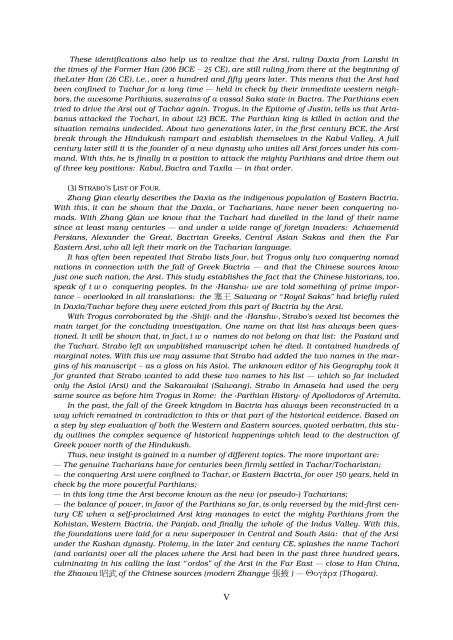張騫 Zhang Qian. The Secret Envoy of Han Emperor Wu in Search of the Arsi (Yuezhi) and the Fall of the Græco-Bactrian Kingdom. (Annotated Compilation of Eastern and Western Sources)
The study undertakes: — to clarify in what year Zhang Qian reached the Oxus river; to establish that the Daxia 大夏 in Shiji 123 represent the Tachar/Tochar of Tochar-i-stan; to explain how we are to understand the "List of Four" in Strabon 11.8.2.
The study undertakes: —
to clarify in what year Zhang Qian reached the Oxus river;
to establish that the Daxia 大夏 in Shiji 123 represent the Tachar/Tochar of Tochar-i-stan;
to explain how we are to understand the "List of Four" in Strabon 11.8.2.
Create successful ePaper yourself
Turn your PDF publications into a flip-book with our unique Google optimized e-Paper software.
<strong>The</strong>se identifications also help us to realize that <strong>the</strong> <strong>Arsi</strong>, rul<strong>in</strong>g Daxia from Lanshi <strong>in</strong><br />
<strong>the</strong> times <strong>of</strong> <strong>the</strong> Former <strong>Han</strong> (206 BCE – 25 CE), are still rul<strong>in</strong>g from <strong>the</strong>re at <strong>the</strong> beg<strong>in</strong>n<strong>in</strong>g <strong>of</strong><br />
<strong>the</strong>Later <strong>Han</strong> (26 CE), i.e., over a hundred <strong>and</strong> fifty years later. This means that <strong>the</strong> <strong>Arsi</strong> had<br />
been conf<strong>in</strong>ed to Tachar for a long time — held <strong>in</strong> check by <strong>the</strong>ir immediate western neighbors,<br />
<strong>the</strong> awesome Parthians, suzera<strong>in</strong>s <strong>of</strong> a vassal Saka state <strong>in</strong> Bactra. <strong>The</strong> Parthians even<br />
tried to drive <strong>the</strong> <strong>Arsi</strong> out <strong>of</strong> Tachar aga<strong>in</strong>. Trogus, <strong>in</strong> <strong>the</strong> Epitome <strong>of</strong> Just<strong>in</strong>, tells us that Artabanus<br />
attacked <strong>the</strong> Tochari, <strong>in</strong> about 123 BCE. <strong>The</strong> Parthian k<strong>in</strong>g is killed <strong>in</strong> action <strong>and</strong> <strong>the</strong><br />
situation rema<strong>in</strong>s undecided. About two generations later, <strong>in</strong> <strong>the</strong> first century BCE, <strong>the</strong> <strong>Arsi</strong><br />
break through <strong>the</strong> H<strong>in</strong>dukush rampart <strong>and</strong> establish <strong>the</strong>mselves <strong>in</strong> <strong>the</strong> Kabul Valley. A full<br />
century later still it is <strong>the</strong> founder <strong>of</strong> a new dynasty who unites all <strong>Arsi</strong> forces under his comm<strong>and</strong>.<br />
With this, he is f<strong>in</strong>ally <strong>in</strong> a position to attack <strong>the</strong> mighty Parthians <strong>and</strong> drive <strong>the</strong>m out<br />
<strong>of</strong> three key positions: Kabul, Bactra <strong>and</strong> Taxila — <strong>in</strong> that order.<br />
(3) STRABO’S LIST OF FOUR.<br />
<strong>Zhang</strong> <strong>Qian</strong> clearly describes <strong>the</strong> Daxia as <strong>the</strong> <strong>in</strong>digenous population <strong>of</strong> <strong>Eastern</strong> Bactria.<br />
With this, it can be shown that <strong>the</strong> Daxia, or Tacharians, have never been conquer<strong>in</strong>g nomads.<br />
With <strong>Zhang</strong> <strong>Qian</strong> we know that <strong>the</strong> Tachari had dwelled <strong>in</strong> <strong>the</strong> l<strong>and</strong> <strong>of</strong> <strong>the</strong>ir name<br />
s<strong>in</strong>ce at least many centuries — <strong>and</strong> under a wide range <strong>of</strong> foreign <strong>in</strong>vaders: Achaemenid<br />
Persians, Alex<strong>and</strong>er <strong>the</strong> Great, <strong>Bactrian</strong> Greeks, Central Asian Sakas <strong>and</strong> <strong>the</strong>n <strong>the</strong> Far<br />
<strong>Eastern</strong> <strong>Arsi</strong>, who all left <strong>the</strong>ir mark on <strong>the</strong> Tacharian language.<br />
It has <strong>of</strong>ten been repeated that Strabo lists four, but Trogus only two conquer<strong>in</strong>g nomad<br />
nations <strong>in</strong> connection with <strong>the</strong> fall <strong>of</strong> Greek Bactria — <strong>and</strong> that <strong>the</strong> Ch<strong>in</strong>ese sources know<br />
just one such nation, <strong>the</strong> <strong>Arsi</strong>. This study establishes <strong>the</strong> fact that <strong>the</strong> Ch<strong>in</strong>ese historians, too,<br />
speak <strong>of</strong> t w o conquer<strong>in</strong>g peoples. In <strong>the</strong> ›<strong>Han</strong>shu‹ we are told someth<strong>in</strong>g <strong>of</strong> prime importance<br />
– overlooked <strong>in</strong> all translations: <strong>the</strong> 塞 王 Saiwang or “ Royal Sakas” had briefly ruled<br />
<strong>in</strong> Daxia/Tachar before <strong>the</strong>y were evicted from this part <strong>of</strong> Bactria by <strong>the</strong> <strong>Arsi</strong>.<br />
With Trogus corroborated by <strong>the</strong> ›Shiji‹ <strong>and</strong> <strong>the</strong> ›<strong>Han</strong>shu‹, Strabo’s vexed list becomes <strong>the</strong><br />
ma<strong>in</strong> target for <strong>the</strong> conclud<strong>in</strong>g <strong>in</strong>vestigation. One name on that list has always been questioned.<br />
It will be shown that, <strong>in</strong> fact, t w o names do not belong on that list: <strong>the</strong> Pasiani <strong>and</strong><br />
<strong>the</strong> Tachari. Strabo left an unpublished manuscript when he died. It conta<strong>in</strong>ed hundreds <strong>of</strong><br />
marg<strong>in</strong>al notes. With this we may assume that Strabo had added <strong>the</strong> two names <strong>in</strong> <strong>the</strong> marg<strong>in</strong>s<br />
<strong>of</strong> his manuscript – as a gloss on his Asioi. <strong>The</strong> unknown editor <strong>of</strong> his Geography took it<br />
for granted that Strabo wanted to add <strong>the</strong>se two names to his list — which so far <strong>in</strong>cluded<br />
only <strong>the</strong> Asioi (<strong>Arsi</strong>) <strong>and</strong> <strong>the</strong> Sakaraukai (Saiwang). Strabo <strong>in</strong> Amaseia had used <strong>the</strong> very<br />
same source as before him Trogus <strong>in</strong> Rome: <strong>the</strong> ›Parthian History‹ <strong>of</strong> Apollodoros <strong>of</strong> Artemita.<br />
In <strong>the</strong> past, <strong>the</strong> fall <strong>of</strong> <strong>the</strong> Greek k<strong>in</strong>gdom <strong>in</strong> Bactria has always been reconstructed <strong>in</strong> a<br />
way which rema<strong>in</strong>ed <strong>in</strong> contradiction to this or that part <strong>of</strong> <strong>the</strong> historical evidence. Based on<br />
a step by step evaluation <strong>of</strong> both <strong>the</strong> <strong>Western</strong> <strong>and</strong> <strong>Eastern</strong> sources, quoted verbatim, this study<br />
outl<strong>in</strong>es <strong>the</strong> complex sequence <strong>of</strong> historical happen<strong>in</strong>gs which lead to <strong>the</strong> destruction <strong>of</strong><br />
Greek power north <strong>of</strong> <strong>the</strong> H<strong>in</strong>dukush.<br />
Thus, new <strong>in</strong>sight is ga<strong>in</strong>ed <strong>in</strong> a number <strong>of</strong> different topics. <strong>The</strong> more important are:<br />
— <strong>The</strong> genu<strong>in</strong>e Tacharians have for centuries been firmly settled <strong>in</strong> Tachar/Tocharistan;<br />
— <strong>the</strong> conquer<strong>in</strong>g <strong>Arsi</strong> were conf<strong>in</strong>ed to Tachar, or <strong>Eastern</strong> Bactria, for over 150 years, held <strong>in</strong><br />
check by <strong>the</strong> more powerful Parthians;<br />
— <strong>in</strong> this long time <strong>the</strong> <strong>Arsi</strong> become known as <strong>the</strong> new (or pseudo-) Tacharians;<br />
— <strong>the</strong> balance <strong>of</strong> power, <strong>in</strong> favor <strong>of</strong> <strong>the</strong> Parthians so far, is only reversed by <strong>the</strong> mid-first century<br />
CE when a self-proclaimed <strong>Arsi</strong> k<strong>in</strong>g manages to evict <strong>the</strong> mighty Parthians from <strong>the</strong><br />
Kohistan, <strong>Western</strong> Bactria, <strong>the</strong> Panjab, <strong>and</strong> f<strong>in</strong>ally <strong>the</strong> whole <strong>of</strong> <strong>the</strong> Indus Valley. With this,<br />
<strong>the</strong> foundations were laid for a new superpower <strong>in</strong> Central <strong>and</strong> South Asia: that <strong>of</strong> <strong>the</strong> <strong>Arsi</strong><br />
under <strong>the</strong> Kushan dynasty. Ptolemy, <strong>in</strong> <strong>the</strong> later 2nd century CE, splashes <strong>the</strong> name Tachori<br />
(<strong>and</strong> variants) over all <strong>the</strong> places where <strong>the</strong> <strong>Arsi</strong> had been <strong>in</strong> <strong>the</strong> past three hundred years,<br />
culm<strong>in</strong>at<strong>in</strong>g <strong>in</strong> his call<strong>in</strong>g <strong>the</strong> last “ ordos” <strong>of</strong> <strong>the</strong> <strong>Arsi</strong> <strong>in</strong> <strong>the</strong> Far East — close to <strong>Han</strong> Ch<strong>in</strong>a,<br />
<strong>the</strong> Zhaowu 昭 武 <strong>of</strong> <strong>the</strong> Ch<strong>in</strong>ese sources (modern <strong>Zhang</strong>ye 張 掖 ) — Qog£ra (Thogara).<br />
V


